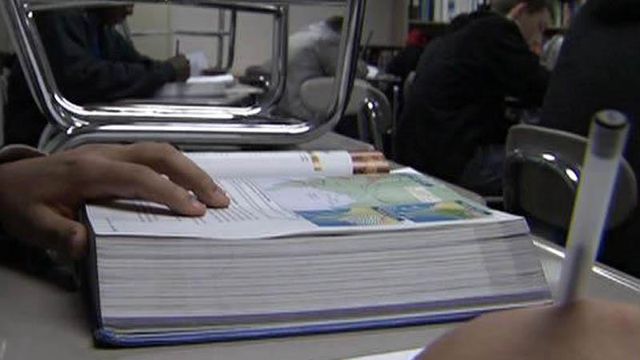Fewer students dropping out in N.C.
About 5 percent of North Carolina high school students dropped out of school last year, marking the first decrease in the state dropout rate in three years, state officials said Thursday.
Posted — UpdatedOverall, 22,434 out of approximately 450,000 North Carolina high school students dropped out of school in the 2007-08 academic year. In the previous year, 23,550 students had left school before graduating.
"Our schools are working harder to make sure they're giving our students hope," Superintendent of Public Instruction June Atkinson said. "We just have to make sure that, beyond that core of academic subjects, we have to give our students options."
Atkinson cited programs like ninth-grade transition programs, early college initiatives and North Carolina's Learn and Earn program, where high school students can earn college credit online, for keeping students in school.
East Wake High School combines four specialty schools in one so students can pursue studies in health sciences, global studies, technology or engineering. The smaller programs ensure students don't get lost in the shuffle, Principal Sebastian Shipp said.
"We are creating a more personalized experience for each one, making sure they are connected to an adult on campus," Shipp said.
"(Keeping students in school) really is about making what is happening at school relevant to what students want to pursue after high school," he said. "(Students will stay in school if) we keep offering different programs and offering different ways that other students can make those connections."
Cutting the dropout rate should lead to increases over the next few years in the state's graduation rate, which measures the number of students who get their high school diploma four years after entering ninth grade, Atkinson said. The four-year graduation rate in 2007-08 was 70.3 percent.
Dropout rates fell in 66 of the state's 115 school districts.
In Wake County, 42 more students dropped out last year than in 2006-07, but the district's growth meant the rate stayed at about 4.2 percent. Durham County's dropout rate fell from 4.9 to 4.2 percent, while Johnston County's fell from 5.4 to 4.9 percent and Chatham County's dropped from 4.6 to 3.9 percent.
The dropout rate in Chapel Hill-Carrboro jumped from 1.1 to 1.5 percent – though it remains the lowest rate in North Carolina – while surrounding Orange County saw its rate rise from 4.3 to 4.6 percent. Cumberland County's rate remained at about 3.6 percent.
Students report a variety of reasons for dropping out, but attendance is the most-reported reason, at 48 percent, followed by enrollment in a community college program, at 16 percent, and academic problems at 7.2 percent.
Every ethnic group except for multiracial students reported lower dropout rates last year. The rates for American Indian and Hispanic students fell from about 7.7 percent to less than 7 percent, but American Indians, Hispanics and blacks continue to exceed the statewide average for dropouts.
Three-fifths of dropouts are boys, and students most frequently drop out in ninth or 10th grades.
Senate Minority Leader Phil Berger called the dropout report "terrible news."
"No one should be patting themselves on the back when one in three of North Carolina's public school students don't graduate," said Berger, a Rockingham County Republican. "Unfortunately, Democrats and their appointees at the State Board of Education and the Department of Public Instruction continue to obscure the full extent of the problem by repeatedly using the more benign-sounding one-year drop out number."
The state report recommended requiring local school boards to set annual graduation benchmarks and urged the boards to revise policies that might be unintentionally pushing students out of school.
• Credits
Copyright 2024 by Capitol Broadcasting Company. All rights reserved. This material may not be published, broadcast, rewritten or redistributed.





